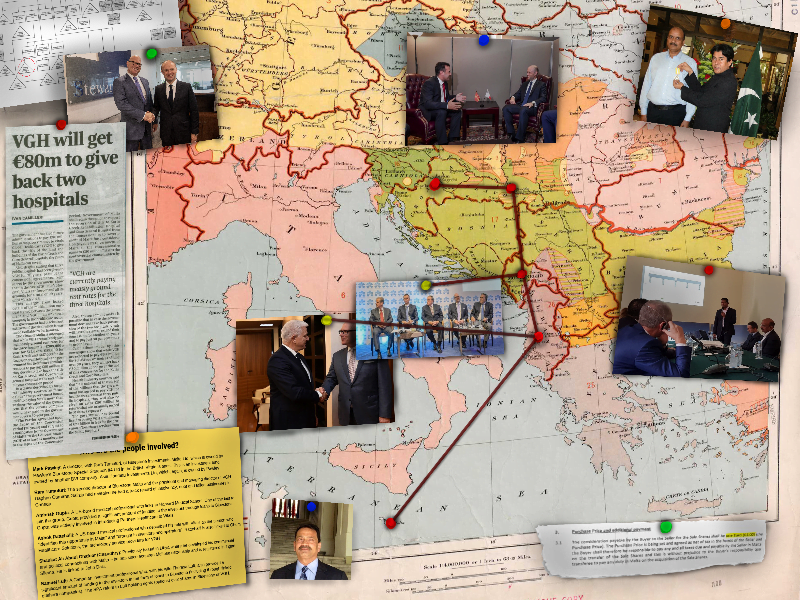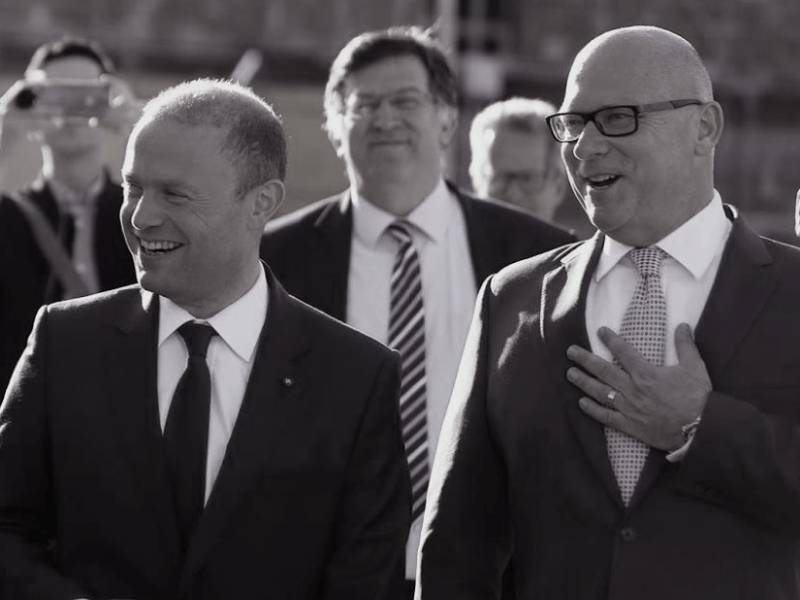When Joseph Muscat, a backbencher, turned up at the Prime Minister’s Office last week to negotiate a request for additional funds by Steward Healthcare, many were surprised. Yet, it built on his role from the start, in one of a number of shady deals linked to the project.
A probe by The Shift, in collaboration with European journalists in the countries of operation, traced the new deals being signed by the once-hidden investors in the Vitals Global Healthcare (VGH) deal. While they failed to deliver in the country, they used the ‘success’ in Malta to pitch the same deal in some of the most corrupt countries in Eastern Europe.
The investigation reveals that the interests of those behind the VGH deal, including Sri Ram Tumuluri and Shaukat Ali Abdul Ghafoor, seemed to run parallel to efforts made by Muscat’s government in the Balkan States.
So, in Montenegro, where Muscat placed water polo coach Karl Izzo as ambassador, and where a wind farm project involving Enemalta came out of nowhere, there was also an agreement signed with VGH. And in countries where VGH was making presentations or deals, representatives of Steward Healthcare were also in the picture.
The US-based company was presented to the Maltese public as “the real deal” after VGH had failed on its commitments. Steward Healthcare took over a concession worth up to €7 billion for only €1, court documents confirm.
The evaluation report published by Opposition Leader Adrian Delia on Saturday revealed facts on the deal that the government had previously kept hidden, including that taxpayers forked out around €150 million to individuals who repeatedly failed to meet commitments.
Delia said the hospitals’ deal showed it was “designed to fail”. VGH’s failure opened the door for Steward Healthcare to step in and save the day.
The cross-border investigation further reveals that the interests of VGH and Steward coincided in more than one country. It begs the question: Was Steward Healthcare “the real deal” or part of the plan from the start?
Malta’s legacy in The Balkans
Working with journalists in Albania and Montenegro, The Shift followed VGH dealings in The Balkans and in former Soviet countries aspiring to become members of the EU.
Muscat was forced out because of revelations of those closest to him on the Electrogas deal. But this was far from the only deal where the interests of Muscat and his circle coincided with private interests linked to those at the helm of government.
The finance minister and another two former ministers under Muscat are the subjects of an ongoing criminal inquiry by a magistrate. Yet, while protests filled the streets of the country’s capital in Malta late last year, a meeting was being held in Montenegro that sought ‘continuity’ on deals.
The official visit of Muscat to Montenegro in November last year, together with his embattled Tourism Minister Konrad Mizzi, raised eyebrows among opposition and critics in both countries.

The trail by the people behind Vitals Global Healthcare and now Steward Healthcare stretches across Eastern Europe and beyond.
While the visit involved a wind farm project, both countries hailed this as a strengthening of relations.
Back in 2016, an agreement had already been signed between the government of Montenegro and Malta-based VGH for a 30-year health service contract. VGH committed to investing €375 million and transform Montenegro’s health care system, much like it did in Malta.
The country’s health minister at the time, Budimir Segrt, had insisted that VGH was a “reputable company” that had “already proved itself” in Malta.
Murky deals with murky governments
In anticipation of the lucrative deal, Ram Tumuluri registered a company in Montenegro called VGH Montenegro on 27 September 2016 – with Tiziano Mousu, the honorary consul to Montenegro at the time.
The Shift has already revealed how the once-hidden investors had also set up offshore companies in Jersey, named after their target countries where they planned to extend the deal.
At the time, Nebojsa Medojevic, one of Montenegro’s opposition leaders, called the deal “another private deal of two corrupt prime ministers who are in love with offshore businesses,” according to news reports in the country.
Shortly after the agreement between the government of Montenegro and VGH was signed, Shaukat Ali Abdul Ghafoor travelled to Albania to negotiate a similar deal with the Albanian government.
The Albanian Ministry of Health then signed an agreement with the Ministry of Health in Montenegro to promote contacts and cooperation between “organisations operating in the field of health in both countries”. This opened the door for health sector deals in both countries similar to that in Malta.
A few months later, VGH Malta was sold to Steward Healthcare for a pittance.
And just as it did in Malta, Steward Healthcare followed in the footsteps of VGH in Montenegro, signing a new agreement with the government in May 2018.
Steward Healthcare’s representative signing the agreement was Armin Ernst, the same person who was in Montenegro two years earlier to negotiate the first deal on behalf of VGH.
This article was developed with the support of journalismfund.eu













